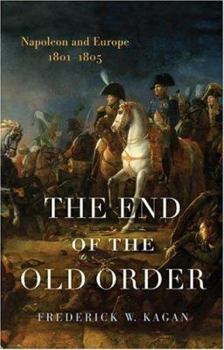The End of the Old Order: Napoleon and Europe, 1801-1805
Select Format
Select Condition 
Book Overview
Perhaps no person in history has dominated his or her own era as much as Napoleon. Despite his small physical stature, the shadow of Napoleon is cast like a colossus, compelling all who would look at... This description may be from another edition of this product.
Format:Hardcover
Language:English
ISBN:0306811375
ISBN13:9780306811371
Release Date:July 2006
Publisher:Perseus Books
Length:774 Pages
Weight:2.50 lbs.
Dimensions:1.8" x 6.2" x 9.2"
Related Subjects
Ethnic & National Europe France History Ireland Irish Military Modern (16th-21st Centuries) Napoleonic Wars WorldCustomer Reviews
5 ratings
Good customer service
Published by Thriftbooks.com User , 16 years ago
The book took longer to arrive than the 5 - 14 business days, but the company checked up frequently on the status on my order through email. When the order became overdue, they offered to send another book or refund the purchase price. I appreciate the customer service and when the book finally did arrive, it did so in perfect condition. I would definitely order from them again.
Simply Amazing
Published by Thriftbooks.com User , 17 years ago
This book is an excellent start to a four part series (other three are unpublished at this time) that delivers pure diplomatic history. This is expert analysis of how the diplomatic machine of Europe brought about an end to stability and peace with the collapse of the old order. Napoleon's designs on Europe are clearly seen and this book takes you through Austerlitz and the start of the Napoleonic Empire. Although Napoleon declares himself Empire it is not truly established until Austerlitz leaving him in control of much of Europe. This book written in fantastic prose clearly outlines how Europe got to that stage. This is a must have for any Napoleonic library and I eagerly await the continuation of this series. Easily five stars and deserves more.
the end of the old order: Napoleon and Europe
Published by Thriftbooks.com User , 17 years ago
I love this book very well written only took me 2 days to read it .
Diplomacy and War like Chess
Published by Thriftbooks.com User , 17 years ago
In this volume(and the 3 that will follow) Kagan sets out to write a military/diplomatic history of the Napoleonic period.The first 200 pages give an overview of how the war of the First Coalition came about. Then there are some 100 pages devoted to the french and allied war plans and the rest of the book covers the war itself.This is a work of explanation and interpretation and the focus is on the diplomats and generals who made the important decisions.There is no spotlight on the idiosyncracies of individuals perse ,but only if it is important to explain some decision taken by that person. Likewise the descriptions of battles are explanatory. There is no blood and guts. All in all it is a bit like a game of chess and the best explanatory book i have read about Napoleonic Europe. The author, in contrast to most other books about this time, devotes an equal amount of space to the French and the Allies and is evenhanded in the condemnation or praise he bestows on the belligerents.It is simply not true as an other reviewer has it that this is the old Napoleon as Ogre story all over again.Knowing the author's very rightleaning political views i indeed started reading this book with some trepidation, but was pleasantly suprised that Kagan did'nt let those views cloud his judgement.Repeatedly Kagan stresses that it was'nt Napoleon who wanted this war but Tsar Alexander. Of course you can take exception with the author's interpretation of motives and events but that applies to every thesis. At least Kagan does't parrot every other author and his analysis is based on thorough archival investigation. This is not a book for the novice but if you want to know the ins and outs of Napoleonic Europe, have an analytical bend and value clear and uncluttered prose this is the book for you. Highly recommended. Hats of for Frederick Kagan and counting down to the next volume.
An interesting thesis
Published by Thriftbooks.com User , 17 years ago
According to Frederick Kagan it was the mistakes made by European nations and not Napoleon's brilliance that lead to France dominating Europe in the first decade of the nineteenth century. First according to Kagan distrust among Britain, Prussia, Austria, and Russia made them form an alliance too late, and in Prussia's case to opt out until the very last moment. Kagan is especially critical of Tsar Alexander I for alienating potential allies by his overly idealistic version of postwar Europe in which both Prussia and Austria would have diminished power in exchange for greater influence of the smaller states in Central Europe. Kagan is also critical of the Austrian leadership for putting too many soldiers in Italy instead of Germany and at General Mack for not retreating from his overextended forces from Ulm. Also Archduke Charles failed to move sufficient forces from Italy to help Mack in Germany. Kagan is especially harsh on Tsar Alexander I for overextending his forces in Italy, around Prussia, and the Balkans, while failing to concentrate them in southern Germany in order to cooperate better with the Austrians. Finally Tsar Alexander I ordered Kutuzov to on the offensive prematurely before the disasterous Austro-Russian defeat at Austerlitz. Although I strongly disagree with Frederick Kagan's personal politics, he does write excellent military history.




